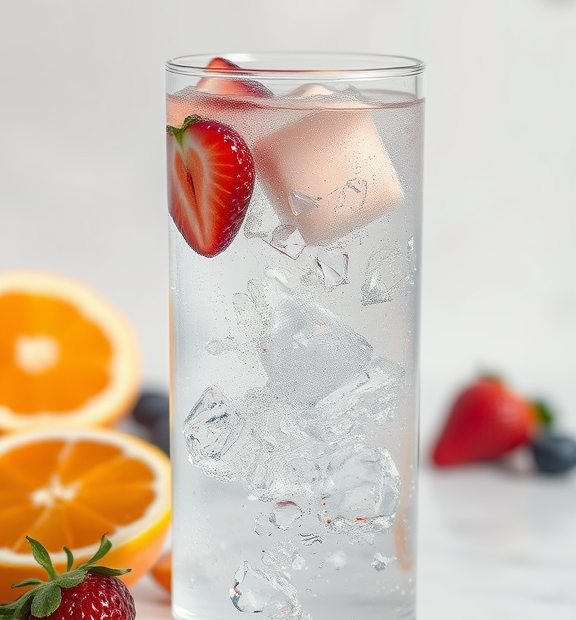The Health Benefits and Concerns of Vitamin Water
Vitamin Water has gained popularity in recent years, often seen as a healthier alternative to sugary sodas and energy drinks. But is vitamin water good for you? To answer this question, it’s essential to look at both its benefits and potential drawbacks.
What’s in Vitamin Water?
Vitamin Water comes in various flavors, each infused with vitamins and minerals. Common ingredients include:
- Vitamins: Often fortified with Vitamin C, B vitamins, and electrolytes.
- Flavors: Made with fruit extracts for taste.
- Sweeteners: May contain sugar or artificial sweeteners, depending on the brand and variety.
The Positive Effects of Vitamin Water
There are several health benefits associated with drinking vitamin water, making it an appealing choice for many individuals:
1. Hydration
Staying hydrated is crucial for maintaining overall health. Vitamin Water can help you meet your daily fluid intake while offering additional nutrients. Proper hydration supports functions like digestion, circulation, and temperature regulation.
2. Vitamins and Minerals
The added vitamins in vitamin water can provide a quick nutrient boost. Vitamin C is important for a healthy immune system, while B vitamins are essential for energy metabolism. These nutrients may be particularly beneficial if your diet lacks variety.
3. Taste
The delicious flavors of vitamin water make it an enjoyable drink. If you struggle to drink plain water, the enticing taste of vitamin water can encourage you to stay hydrated without relying on high-sugar beverages.
Potential Concerns with Vitamin Water
While vitamin water has benefits, there are also some concerns to consider. A balanced view is essential to determine if it fits into your health regimen.
1. Added Sugars
Love what I do? Be a hero and help me keep creating awesome content!
Support My Mission Now!Every donation fuels more great stuff – thank you, legend!
Many brands of vitamin water contain added sugars. Consuming high amounts of sugar can lead to weight gain and increase the risk of chronic diseases like diabetes and heart disease. Be sure to check the nutrition label for sugar content before making it a regular part of your diet.
2. Misleading Marketing
Vitamin water often markets itself as a health drink, which can be misleading. Just because it contains vitamins does not mean it is free from calories or sugar. You should consider it a supplement to a healthy diet, not a substitute for water or whole foods.
3. Potential Overconsumption of Certain Vitamins
Love what I do? Be a hero and help me keep creating awesome content!
Support My Mission Now!Every donation fuels more great stuff – thank you, legend!
Drinking large quantities of vitamin water can lead to excess intake of certain vitamins and minerals. While water-soluble vitamins like B and C are generally safe, it’s still important to monitor your overall dietary intake to avoid potential health issues.
When to Choose Vitamin Water
In certain situations, vitamin water may be a suitable option. Here are a few scenarios when it could be beneficial:
- Post-Workout: After intense exercise, vitamin water can help replenish lost fluids and electrolytes.
- As an Occasional Refreshment: Enjoying vitamin water occasionally can be a fun way to mix things up.
- If You Have Dietary Restrictions: For those who can’t get enough vitamins from their diet, vitamin water can serve as a supplemental source.
Making Informed Choices
When considering whether to include vitamin water in your diet, remember to think critically about your individual health needs. If you favor hydration and want a flavorful drink that includes nutrients, vitamin water might be a good fit—just be mindful of its sugar content and use it as a complementary option rather than a primary source of hydration.
Love what I do? Be a hero and help me keep creating awesome content!
Support My Mission Now!Every donation fuels more great stuff – thank you, legend!
In the end, being aware of both the benefits and drawbacks allows you to make informed choices. Always strive for a balanced diet, rich in whole foods like fruits, vegetables, whole grains, and lean proteins, to ensure you meet your nutritional needs effectively.
Comparing Vitamin Water to Traditional Hydration Options
When it comes to staying hydrated, you have plenty of options. Water is the simplest and most natural choice, but drinks like vitamin water are gaining popularity. If you’re wondering if vitamin water is a better alternative or if traditional hydration methods still hold the crown, you’ve come to the right place. Let’s dive into a comparison of vitamin water and traditional hydration options.
Love what I do? Be a hero and help me keep creating awesome content!
Support My Mission Now!Every donation fuels more great stuff – thank you, legend!
Vitamin water comes in many flavors and is often marketed as a health drink enriched with vitamins and electrolytes. But is it good for you? To answer that, let’s look at the key differences between vitamin water and plain water.
Ingredients and Nutrients
Traditional water is calorie-free, sugar-free, and contains no additives. In contrast, vitamin water often contains:
- Added sugars or sweeteners
- Nutrients such as vitamin C, B vitamins, and electrolytes
- Flavorings that can come from natural or artificial sources
This means that while vitamin water can provide vitamins and hydration, it may also introduce added calories and sugars into your diet. Over time, consuming drinks high in sugar may lead to weight gain and other health issues.
Hydration Efficiency
Hydration generally means maintaining an adequate fluid balance in your body. Plain water is essential for your body’s functions—hydrating muscles, regulating temperature, and lubricating joints. Vitamin water can replace fluids, but its sugar content may slow its absorption. Therefore, when you’re looking to quickly hydrate after exercise, plain water may prove to be the more effective option.
Suitability for Different Lifestyles
Choosing between vitamin water and traditional water may also depend on your lifestyle. Here are a few considerations:
- Active Individuals: If you’re highly active, you might benefit from the electrolytes in vitamin water. However, be mindful of the sugar content.
- Casual Drinkers: If hydration is your goal without needing vitamins, traditional water is better. It’s simple and effective.
- Diet Monitoring: If you’re watching your calorie intake or sugar consumption, plain water is the clearer choice.
Health Factors
When thinking about health impacts, consider any dietary restrictions or existing health conditions. Individuals with diabetes or those monitoring their sugar intake might want to steer clear of vitamin water. Always read labels carefully. Knowing what ingredients are present is crucial for making informed choices.
Cost Considerations
Price can also play a role in your decision. Compared to traditional water, which is typically very affordable or even free, vitamin water can be more expensive. Bottled drinks may be convenient but can add up over time. If you’re on a budget, refilling your water bottle is a simple, cost-effective strategy.
Environmental Impact
Consider the environmental factor. Single-use plastic bottles contribute to pollution. While many brands now offer recyclable packaging, relying on bottled vitamin water can increase your plastic footprint. Opting for tap water or a refillable water container can dramatically reduce waste.
To sum it all up, vitamin water does have its appeal with added nutrients and flavors, but it’s essential to think about its sugar content and overall hydration value. For most people, traditional water is still the gold standard for staying hydrated. If you choose to indulge in vitamin water, moderation is key. Always prioritize understanding your body’s hydration needs and consider options that align with your health and lifestyle goals.
Love what I do? Be a hero and help me keep creating awesome content!
Support My Mission Now!Every donation fuels more great stuff – thank you, legend!
In the end, whether you prefer vitamin water or plain water, the most important thing is to stay hydrated. Listen to your body and make choices that best support your well-being.
Conclusion
When considering whether vitamin water is good for you, it’s important to weigh the benefits and drawbacks thoughtfully. On one hand, vitamin water can offer a convenient way to get essential vitamins and minerals, especially for those who may struggle to meet their daily nutrient requirements through diet alone. With flavors that make hydration more enjoyable, it can be appealing for individuals who often choose sugary sodas or flavored drinks.
Love what I do? Be a hero and help me keep creating awesome content!
Support My Mission Now!Every donation fuels more great stuff – thank you, legend!
However, not all vitamin waters are created equal, and some contain added sugars and calories that can undermine a healthy diet. It’s crucial to read labels carefully and opt for options that are lower in sugar or contain natural sweeteners.
When comparing vitamin water to more traditional hydration options like plain water or herbal teas, you must consider personal hydration goals and dietary needs. While traditional hydration options provide zero calories and no added sugars, they may lack the vitamins and minerals some people seek. Maintaining a balance between hydration and nutrient intake is essential for your overall health.
Ultimately, whether vitamin water is good for you depends on your lifestyle and health goals. If you’re active, need a flavor boost in your hydration, and choose wisely among the options available, vitamin water can be a tasty addition, not a replacement. Just remember that no drink can substitute a well-rounded diet. Enjoy it as a rare treat while continuing to prioritize water and whole foods for your nutrition and hydration needs.

